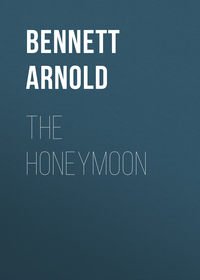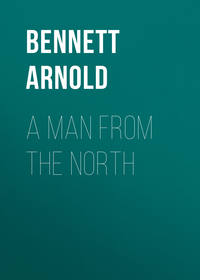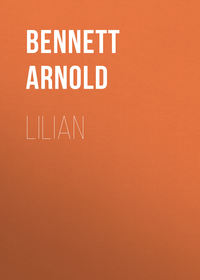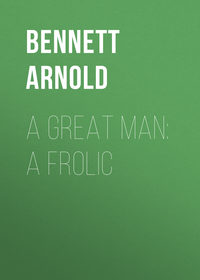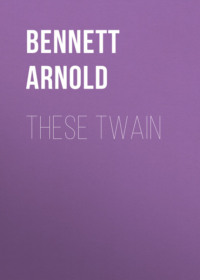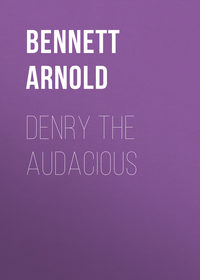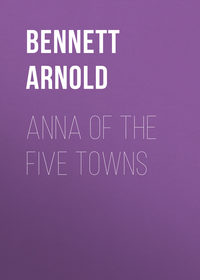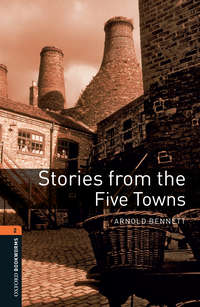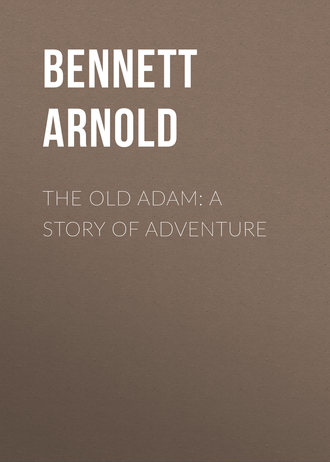 полная версия
полная версияThe Old Adam: A Story of Adventure
The last rubber finished in the neighbourhood of Willesden, and Edward Henry, having won eighteen pence halfpenny, was exuberantly content, for Messrs. Garvin, Quorrall, and Brindley were all renowned card-players. The cushion was thrown away, and a fitful conversation occupied the few remaining minutes of the journey.
"Where do you put up?" Brindley asked Edward Henry.
"Majestic," said Edward Henry. "Where do you?"
"Oh! Kingsway, I suppose."
The Majestic and the Kingsway were two of the half-dozen very large and very mediocre hotels in London which, from causes which nobody, and especially no American, has ever been able to discover, are particularly affected by Midland provincials "on the jaunt." Both had an immense reputation in the Five Towns.
There was nothing new to say about the Majestic and the Kingsway, and the talk flagged until Mr. Quorrall mentioned Seven Sachs. The mighty Seven Sachs, in his world-famous play, "Overheard," had taken precedence of all other topics in the Five Towns during the previous week. He had crammed the theatre and half emptied the Empire Music Hall for six nights; a wonderful feat. Incidentally, his fifteen hundredth appearance in "Overheard" had taken place in the Five Towns, and the Five Towns had found in this fact a peculiar satisfaction, as though some deep merit had thereby been acquired or rewarded. Seven Sachs's tour was now closed, and on the Sunday he had gone to London, en route for America.
"I heard he stops at Wilkins's," said Mr. Garvin.
"Wilkins's your grandmother!" Brindley essayed to crush Mr. Garvin.
"I don't say he does stop at Wilkins's," said Mr. Garvin, an individual not easy to crush, "I only say I heard as he did."
"They wouldn't have him!" Brindley insisted firmly.
Mr. Quorrall at any rate seemed tacitly to agree with Brindley. The august name of Wilkins's was in its essence so exclusive that vast numbers of fairly canny provincials had never heard of it. Ask ten well-informed provincials which is the first hotel in London, and nine of them would certainly reply, the Grand Babylon. Not that even wealthy provincials from the industrial districts are in the habit of staying at the Grand Babylon! No! Edward Henry, for example, had never stayed at the Grand Babylon, no more than he had ever bought a first-class ticket on a railroad. The idea of doing so had scarcely occurred to him. There are certain ways of extravagant smartness which are not considered to be good form among solid wealthy provincials. Why travel first-class (they argue), when second is just as good and no one can tell the difference once you get out of the train? Why ape the tricks of another stratum of society? They like to read about the dinner-parties and supper-parties at the Grand Babylon; but they are not emulous, and they do not imitate. At their most adventurous they would lunch or dine in the neutral region of the grill-room at the Grand Babylon. As for Wilkins's, in Devonshire Square, which is infinitely better known among princes than in the Five Towns, and whose name is affectionately pronounced with a "V" by half the monarchs of Europe, few industrial provincials had ever seen it. The class which is the back-bone of England left it serenely alone to royalty and the aristocratic parasites of royalty.
"I don't see why they shouldn't have him," said Edward Henry, as he lifted a challenging nose in the air.
"Perhaps you don't, Alderman!" said Brindley.
"I wouldn't mind going to Wilkins's," Edward Henry persisted.
"I'd like to see you," said Brindley, with curt scorn.
"Well," said Edward Henry, "I'll bet you a fiver I do." Had he not won eighteen pence half-penny? And was he not securely at peace with his wife?
"I don't bet fivers," said the cautious Brindley. "But I'll bet you half a crown."
"Done!" said Edward Henry.
"When will you go?"
"Either to-day or to-morrow. I must go to the Majestic first, because I've ordered a room and so on."
"Ha!" hurled Brindley, as if to insinuate that Edward Henry was seeking to escape from the consequences of his boast.
And yet he ought to have known Edward Henry. He did know Edward Henry. And he hoped to lose his half-crown. On his face and on the faces of the other two was the cheerful admission that tales of the doings of Alderman Machin, the great local card, at Wilkins's-if he succeeded in getting in-would be cheap at half a crown.
Porters cried out "Euston!"
IIIt was rather late in the afternoon when Edward Henry arrived in front of the façade of Wilkins's. He came in a taxicab, and though the distance from the Majestic to Wilkins's is not more than a couple of miles, and he had had nothing else to preoccupy him after lunch, he had spent some three hours in the business of transferring himself from the portals of the one hotel to the portals of the other. Two hours and three-quarters of this period of time had been passed in finding courage merely to start. Even so, he had left his luggage behind him. He said to himself that, first of all, he would go and spy out Wilkins's; in the perilous work of scouting he rightly wished to be unhampered by impedimenta; moreover, in case of repulse or accident, he must have a base of operations upon which he could retreat in good order.
He now looked on Wilkins's for the first time in his life; and he was even more afraid of it than he had been while thinking about it in the vestibule of the Majestic. It was not larger than the Majestic; it was perhaps smaller; it could not show more terra cotta, plate glass, and sculptured cornice than the Majestic. But it had a demeanour … and it was in a square which had a demeanour… In every window-sill-not only of the hotel, but of nearly every mighty house in the square-there were boxes of bright-blooming flowers. These he could plainly distinguish in the October dusk, and they were a wonderful phenomenon-say what you will about the mildness of that particular October! A sublime tranquillity reigned over the scene. A liveried keeper was locking the gate of the garden in the middle of the square as if potentates had just quitted it and rendered it forever sacred. And between the sacred shadowed grove and the inscrutable fronts of the stately houses, there flitted automobiles of the silent and expensive kind, driven by chauffeurs in pale grey or dark purple, who reclined as they steered, and who were supported on their left sides by footmen who reclined as they contemplated the grandeur of existence.
Edward Henry's taxicab in that square seemed like a homeless cat that had strayed into a dog-show.
At the exact instant when the taxicab came to rest under the massive portico of Wilkins's, a chamberlain in white gloves bravely soiled the gloves by seizing the vile brass handle of its door. He bowed to Edward Henry, and assisted him to alight on to a crimson carpet. The driver of the taxi glanced with pert and candid scorn at the chamberlain, but Edward Henry looked demurely aside, and then in abstraction mounted the broad carpeted steps.
"What about poor little me?" cried the driver, who was evidently a ribald socialist, or at best a republican.
The chamberlain, pained, glanced at Edward Henry for support and direction in this crisis.
"Didn't I tell you I'd keep you?" said Edward Henry, raised now by the steps above the driver.
"Between you and me, you didn't," said the driver.
The chamberlain, with an ineffable gesture, wafted the taxicab away into some limbo appointed for waiting vehicles.
A page opened a pair of doors, and another page opened another pair of doors, each with eighteen-century ceremonies of deference, and Edward Henry stood at length in the hall of Wilkins's. The sanctuary, then, was successfully defiled, and up to the present nobody had demanded his credentials! He took breath.
In its physical aspects Wilkins's appeared to him to resemble other hotels-such as the Majestic. And so far he was not mistaken. Once Wilkins's had not resembled other hotels. For many years it had deliberately refused to recognise that even the Nineteenth Century had dawned, and its magnificent antique discomfort had been one of its main attractions to the elect. For the elect desired nothing but their own privileged society in order to be happy in a hotel. A hip bath on a blanket in the middle of the bedroom floor richly sufficed them, provided they could be guaranteed against the calamity of meeting the unelect in the corridors or at table d'hôte. But the rising waters of democracy-the intermixture of classes-had reacted adversely on Wilkins's. The fall of the Emperor Maximilian of Mexico had given Wilkins's sad food for thought long, long ago, and the obvious general weakening of the monarchical principle had most considerably shaken it. Came the day when Wilkins's reluctantly decided that even it could not fight against the tendency of the whole world, and then, at one superb stroke, it had rebuilt and brought itself utterly up-to-date.
Thus it resembled other hotels. (Save possibly in the reticence of its advertisements! The Majestic would advertise bathrooms as a miracle of modernity, just as though common dwelling-houses had not possessed bathrooms for the past thirty years. Wilkins's had superlative bathrooms, but it said nothing about them. Wilkins's would as soon have advertised two hundred bathrooms as two hundred bolsters; and for the new Wilkins's a bathroom was not more modern than a bolster.) Also, other hotels resembled Wilkins's. The Majestic, too, had a chamberlain at its portico, and an assortment of pages to prove to its clients that they were incapable of performing the simplest act for themselves. Nevertheless, the difference between Wilkins's and the Majestic was enormous; and yet so subtle was it that Edward Henry could not immediately detect where it resided. Then he understood. The difference between Wilkins's and the Majestic resided in the theory which underlay its manner. And the theory was that every person entering its walls was of royal blood until he had admitted the contrary.
Within the hotel it was already night.
Edward Henry self-consciously crossed the illuminated hall, which was dotted with fashionable figures. He knew not whither he was going, until by chance he saw a golden grille with the word "Reception" shining over it in letters of gold. Behind this grille, and still further protected by an impregnable mahogany counter, stood three young dandies in attitudes of graceful ease. He approached them. The fearful moment was upon him. He had never in his life been so genuinely frightened. Abject disgrace might be his portion within the next ten seconds.
Addressing himself to the dandy in the middle, he managed to articulate:
"What have you got in the way of rooms?"
Could the Five Towns have seen him then, as he waited, it would hardly have recognised its "card," its character, its mirror of aplomb and inventive audacity, in this figure of provincial and plebeian diffidence.
The dandy bowed.
"Do you want a suite, sir?"
"Certainly!" said Edward Henry. Rather too quickly, rather too defiantly; in fact, rather rudely! A habitué would not have so savagely hurled back in the dandy's teeth the insinuation that he wanted only one paltry room.
However, the dandy smiled, accepting with meekness Edward Henry's sudden arrogance, and consulted a sort of pentateuch that was open in front of him.
No person in the hall saw Edward Henry's hat fly up into the air and fall back on his head. But in the imagination of Edward Henry, that was what his hat did.
He was saved. He would have a proud tale for Brindley. The thing was as simple as the alphabet. You just walked in and they either fell on your neck or kissed your feet.
Wilkins's indeed!
A very handsome footman, not only in white gloves but in white calves, was soon supplicating him to deign to enter a lift. And when he emerged from the lift another dandy-in a frock-coat of Paradise-was awaiting him with obeisances. Apparently it had not yet occurred to anybody that he was not the younger son of some aged king.
He was prayed to walk into a gorgeous suite consisting of a corridor, a noble drawing-room (with portrait of His Majesty of Spain on the walls), a large bedroom with two satinwood beds, a small bedroom, and a bathroom, all gleaming with patent devices in porcelain and silver that fully equalled those at home.
Asked if this suite would do, he said it would, trying as well as he could to imply that he had seen better. Then the dandy produced a note-book and a pencil, and impassively waited. The horrid fact that he was un-elect could no longer be concealed. "E. H. Machin, Bursley," he said shortly, and added: "Alderman Machin." After all, why should he be ashamed of being an alderman?
To his astonishment the dandy smiled very cordially, though always with profound respect.
"Ah, yes!" said the dandy. It was as though he had said: "We have long wished for the high patronage of this great reputation." Edward Henry could make naught of it.
His opinion of Wilkins's went down.
He followed the departing dandy up the corridor to the door of the suite in an entirely vain attempt to enquire the price of the suite per day. Not a syllable would pass his lips. The dandy bowed and vanished. Edward Henry stood lost at his own door, and his wandering eye caught sight of a pile of trunks near to another door in the main corridor. These trunks gave him a terrible shock. He shut out the rest of the hotel and retired into his private corridor to reflect. He perceived only too plainly that his luggage, now at the Majestic, never could come into Wilkins's. It was not fashionable enough. It lacked elegance. The lounge suit that he was wearing might serve, but his luggage was totally impossible. Never before had he imagined that the aspect of one's luggage could have the least importance in one's scheme of existence. He was learning, and he frankly admitted that he was in an incomparable mess.
IIIAt the end of an extensive stroll through and round his new vast domain, he had come to no decision upon a course of action. Certain details of the strange adventure pleased him-as for instance the dandy's welcoming recognition of his name; that, though puzzling, was a source of comfort to him in his difficulties. He also liked the suite; nay more, he was much impressed by its gorgeousness, and such novel complications as the forked electric switches, all of which he turned on, and the double windows, one within the other, appealed to the domestic expert in him; indeed, he at once had the idea of doubling the window of the best bedroom at home; to do so would be a fierce blow to the Five Towns Electric Traction Company, which, as everybody knew, delighted to keep everybody awake at night and at dawn by means of its late and its early tram-cars. However, he could not wander up and down the glittering solitude of his extensive suite for ever. Something must be done. Then he had the notion of writing to Nellie; he had promised himself to write to her daily; moreover, it would pass the time and perhaps help him to some resolution.
He sat down to a delicate Louis XVI desk on which lay a Bible, a Peerage, a telephone-book, a telephone, a lamp, and much distinguished stationery. Between the tasselled folds of plushy curtains that pleated themselves with the grandeur of painted curtains in a theatre, he glanced out at the lights of Devonshire Square, from which not a sound came. Then he lit the lamp and unscrewed his fountain pen.
"My dear wife-"
That was how he always began, whether in storm or sunshine. Nellie always began, "My darling husband"; but he was not a man to fling darlings about. Few husbands in the Five Towns are. He thought "darling," but he never wrote it, and he never said it, save quizzingly.
After these three words the composition of the letter came to a pause. What was he going to tell Nellie? He assuredly was not going to tell her that he had engaged an unpriced suite at Wilkins's. He was not going to mention Wilkins's. Then he intelligently perceived that the note-paper and also the envelope mentioned Wilkins's in no ambiguous manner. He tore up the sheet and searched for plain paper. Now, on the desk there was the ordinary hotel stationery, mourning stationery, cards, letter-cards, and envelopes for every mood; but not a piece that was not embossed with the historic name in royal blue. The which appeared to Edward Henry to point to a defect of foresight on the part of Wilkins's. At the gigantic political club to which he belonged, and which he had occasionally visited in order to demonstrate to himself and others that he was a club-man, plain stationery was everywhere provided for the use of husbands with a taste for reticence. Why not at Wilkins's also?
On the other hand, why should he not write to his wife on Wilkins's paper? Was he afraid of his wife? He was not. Would not the news ultimately reach Bursley that he had stayed at Wilkins's? It would. Nevertheless, he could not find the courage to write to Nellie on Wilkins's paper.
He looked around. He was fearfully alone. He wanted the companionship, were it only momentary, of something human. He decided to have a look at a flunkey, and he rang a bell.
Immediately, just as though wafted thither on a magic carpet, from the court of Austria, a gentleman in waiting arrived in the doorway of the drawing-room, planted himself gracefully on his black silk calves, and bowed.
"I want some plain note-paper, please."
"Very good, sir." Oh! Perfection of tone and of mien!
Three minutes later the plain note-paper and envelopes were being presented to Edward Henry on a salver. As he took them, he looked enquiringly at the gentleman in waiting, who supported his gaze with an impenetrable, invulnerable servility. Edward Henry, beaten off with great loss, thought: "There's nothing doing here just now in the human companionship line," and assumed the mask of a hereditary prince.
The black calves carried away their immaculate living burden, set above all earthly ties.
He wrote nicely to Nellie about the weather and the journey, and informed her also that London seemed as full as ever, and that he might go to the theatre, but he wasn't sure. He dated the letter from the Majestic.
As he was finishing it, he heard mysterious, disturbing footfalls in his private corridor, and after trying for some time to ignore them, he was forced by a vague alarm to investigate their origin. A short middle-aged, pallid man, with a long nose and long moustaches, wearing a red and black-striped sleeved waistcoat and a white apron, was in the corridor. At the Turk's Head such a person would have been the boots. But Edward Henry remembered a notice under the bell, advising visitors to ring once for the waiter, twice for the chambermaid, and three times for the valet. This, then, was the valet. In certain picturesque details of costume Wilkins's was coquettishly French.
"What is it?" he demanded.
"I came to see if your luggage had arrived, sir. No doubt your servant is bringing it. Can I be of any assistance to you?"
The man thoughtfully twirled one end of his moustache. It was an appalling fault in demeanour; but the man was proud of his moustache.
"The first human being I've met here!" thought Edward Henry, attracted too by a gleam in the eye of this eternal haunter of corridors.
"His servant!" He saw that something must be done, and quickly. Wilkins's provided valets for emergencies, but obviously it expected visitors to bring their own valets in addition. Obviously existence without a private valet was inconceivable to Wilkins's.
"The fact is," said Edward Henry, "I'm in a very awkward situation." He hesitated, seeking to and fro in his mind for particulars of the situation.
"Sorry to hear that, sir."
"Yes, a very awkward position." He hesitated again. "I'd booked passages for myself and my valet on the Minnetonka, sailing from Tilbury at noon to-day, and sent him on in front with my stuff, and at the very last moment I've been absolutely prevented from sailing! You see how awkward it is! I haven't a thing here."
"It is indeed, sir! And I suppose he's gone on, sir?"
"Of course he has! He wouldn't find out till after she sailed that I wasn't on board. You know the crush and confusion there is on those big liners just before they start." Edward Henry had once assisted, under very dramatic circumstances, at the departure of a transatlantic liner from Liverpool.
"Just so, sir!"
"I've neither servant nor clothes!" He considered that so far he was doing admirably. Indeed, the tale could not have been bettered, he thought. His hope was that the fellow would not have the idea of consulting the shipping intelligence in order to confirm the departure of the Minnetonka from Tilbury that day. Possibly the Minnetonka never had sailed and never would sail from Tilbury. Possibly she had been sold years ago. He had selected the first ship's name that came into his head. What did it matter?
"My man," he added to clinch-the proper word "man" had only just occurred to him-"my man can't be back again under three weeks at the soonest."
The valet made one half-eager step towards him.
"If you're wanting a temporary valet, sir, my son's out of a place for the moment-through no fault of his own. He's a very good valet, sir, and soon learns a gentleman's ways."
"Yes," said Edward Henry judiciously. "But could he come at once? That's the point." And he looked at his watch, as if to imply that another hour without a valet would be more than human nature could stand.
"I could have him round here in less than an hour, sir," said the hotel valet, comprehending the gesture. "He's at Norwich Mews-Berkeley Square way, sir."
Edward Henry hesitated.
"Very well, then!" he said commandingly. "Send for him. Let me see him."
He thought:
"Dash it! I'm at Wilkins's-I'll be at Wilkins's!"
"Certainly, sir! Thank you very much, sir."
The hotel valet was retiring when Edward Henry called him back.
"Stop a moment. I'm just going out. Help me on with my overcoat, will you?"
The man jumped.
"And you might get me a tooth-brush," Edward Henry airily suggested. "And I've a letter for the post."
As he walked down Devonshire Square in the dark, he hummed a tune: certain sign that he was self-conscious, uneasy, and yet not unhappy. At a small but expensive hosier's in a side street he bought a shirt and a suit of pajamas, and also permitted himself to be tempted by a special job line of hair-brushes that the hosier had in his fancy department. On hearing the powerful word "Wilkins's," the hosier promised with passionate obsequiousness that the goods should be delivered instantly.
Edward Henry cooled his excitement by an extended stroll, and finally re-entered the outer hall of the hotel at half-past seven, and sat down therein to see the world. He knew by instinct that the boldest lounge suit must not at that hour penetrate further into the public rooms of Wilkins's.
The world at its haughtiest was driving up to Wilkins's to eat its dinner in the unrivalled restaurant, and often guests staying at the hotel came into the outer hall to greet invited friends. And Edward Henry was so overfaced by visions of woman's brilliance and man's utter correctness that he scarcely knew where to look-so apologetic was he for his grey lounge suit and the creases in his boots. In less than a quarter of an hour he appreciated with painful clearness that his entire conception of existence had been wrong, and that he must begin again at the beginning. Nothing in his luggage at the Majestic would do. His socks would not do, nor his shoes, nor the braid on his trousers, nor his cuff-links, nor his ready-made white bow, nor the number of studs in the shirt-front, nor the collar of his coat. Nothing! Nothing! To-morrow would be a full day.
He ventured apologetically into the lift. In his private corridor a young man respectfully waited, hat in hand, the paternal red-and-black waistcoat by his side for purposes of introduction. The young man was wearing a rather shabby blue suit, but a rich and distinguished overcoat that fitted him ill. In another five minutes Edward Henry had engaged a skilled valet, aged twenty-four, name Joseph, with a testimonial of efficiency from Sir Nicholas Winkworth, Bart., at a salary of a pound a week and all found.




